Shipping container homes in North Carolina are becoming more and more popular. Container homes, also known as shipping container homes or Conex homes, are sustainable living spaces built using repurposed shipping containers.
These containers are designed to be transported across long distances and are now being utilized as the primary building blocks for unique and innovative homes.
North Carolina, a state known for its beautiful landscapes and vibrant culture, has witnessed a significant surge in the popularity of container homes in recent years.
As more and more people seek sustainable and cost-effective housing solutions, container homes have emerged as an appealing choice.
With their ability to withstand extreme weather conditions, flexibility in design, and eco-friendly nature, container homes are proving to be an excellent option for those looking to minimize both their environmental impact and construction costs.
The answer to the big question is that shipping container homes are allowed in North Carolina. The North Carolina authorities approve these homes. To set up your container home in North Carolina, you first need to acquire a building permit from the relevant authorities.
Join the growing community of container home enthusiasts in North Carolina and explore the possibilities of container home living.
Whether you’re considering a modern, urban dwelling or a cozy countryside retreat, container homes offer endless potential for creating unique, personalized spaces.
Table of Contents
Brief History of Shipping Containers in North Carolina
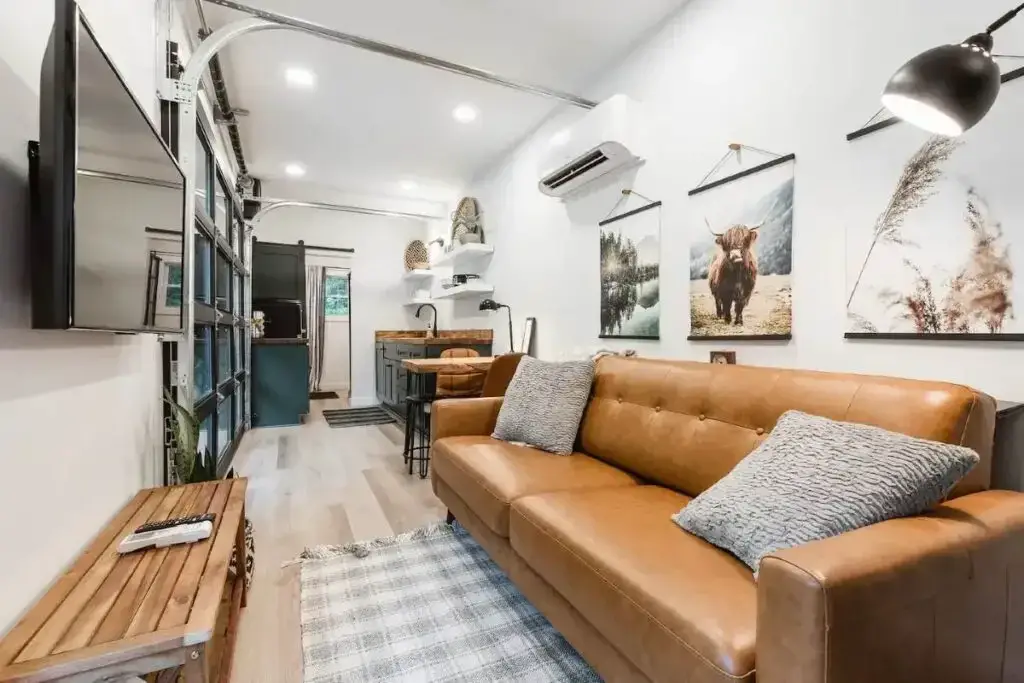
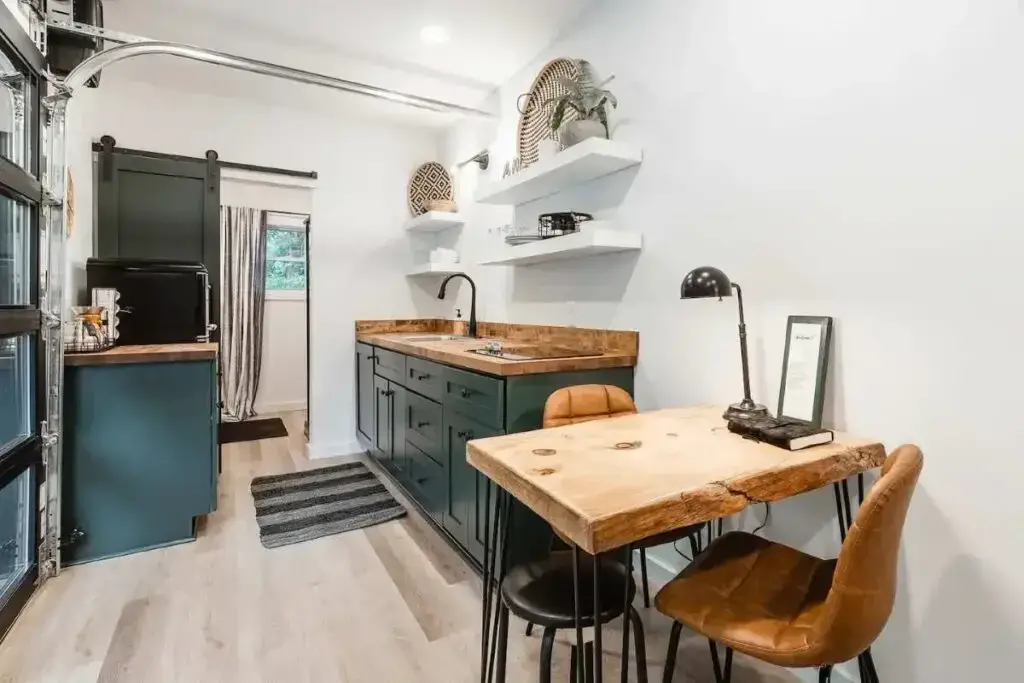
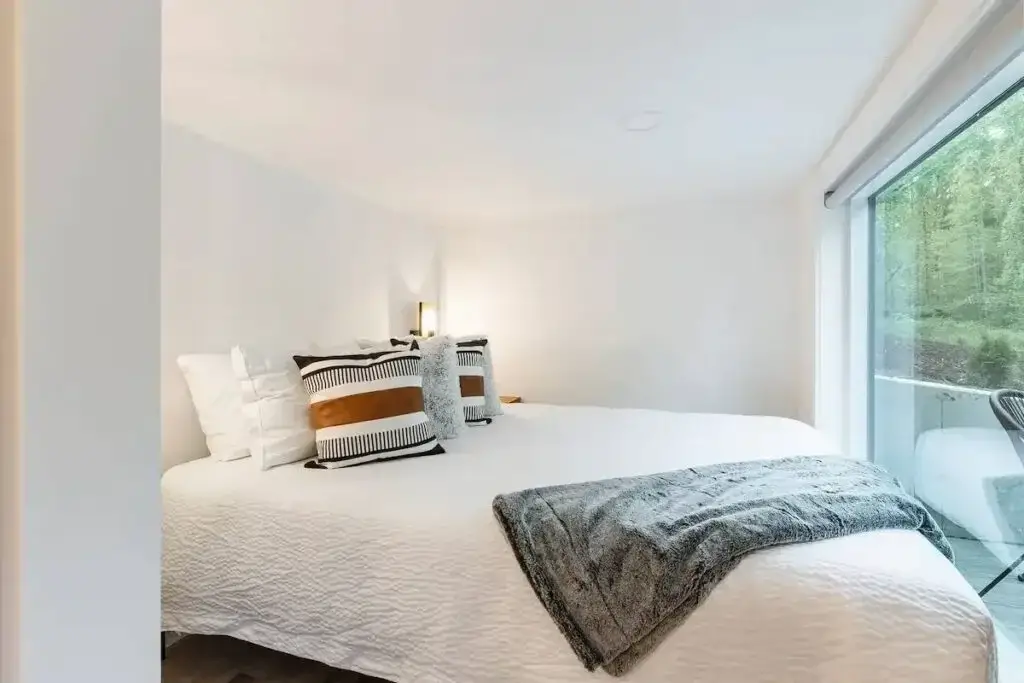
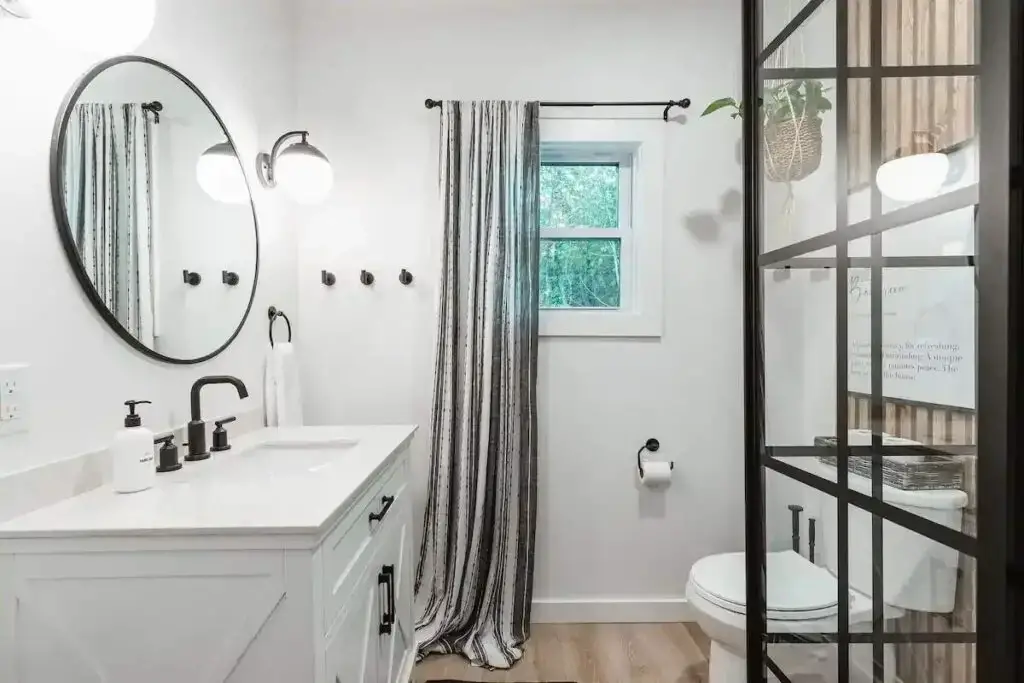
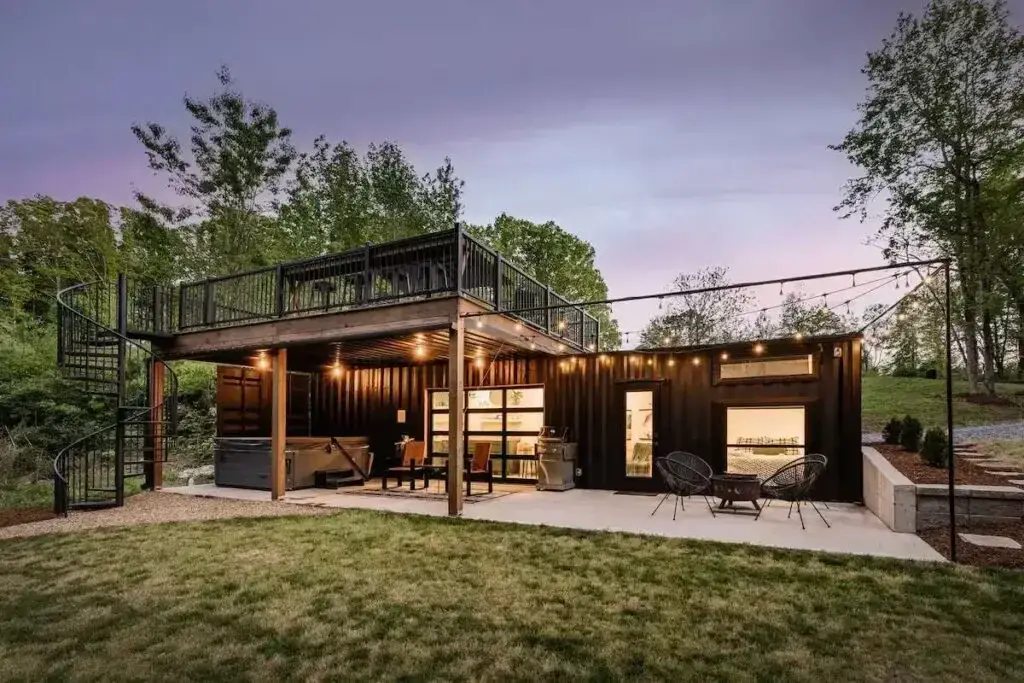
Even though shipping containers are rising fast in popularity, few people know their origin. These containers were invented by Malcolm Purcell McLean, a North Carolinian. The New York Times reports that he reinvented worldwide shipping and is referred to as the “Father of Containerization.”
Malcolm was a businessman who worked as a truck driver when he started. His father was a farmer, and his legacy spread from the empty tobacco barrels he dragged into a trailer.
Just three years after completing high school education, Malcolm and his siblings initiated the McLean Trucking Company. The grand idea of shipping containers came to McLean in 1937 as he was watching dockers unload and load goods in New Jersey.
The idea struck McLean that creating cargo containers that would sort and pack the cargo would be more effective. In 1955, McLean sold his trucking company shares and bought an Alabama steamship company.
Read More: Shipping Containers for Sale in North Carolina
Constructing a Container Home in NC
Building a shipping container home in NC is legal and possible if you follow some laid-out regulations. First, you need to secure a permit from the North Carolina authorities (I’ll show you how to go about this later in the article).
Before setting up the structure, you also have to go through the zoning codes, laws, and building rules. That is because the shipping container home should be suitable for human inhabitance, and not a death trap.
The truth is that allowing for the building of shipping container homes was not easy. This is largely due to the nature of shipping containers. As you may already know, sea containers are primarily made of steel, and they can be extra hot during high temperatures.
Even if the container has ventilation, it can be pretty hot, which is why the state never accepted these homes easily. If that is a single container, you can imagine what of having a house made entirely out of steel or aluminum.
However, with some minor tweaks and adjustments, the room temperature can be contained. And for this reason, North Carolina accepted them as a form of intermodal homes.
The state also ensures that certain conditions are met to make these homes suitable for pets and humans before building them.
These regulations and laws were not to restrict people from building the shipping container homes but to make sure the houses were safe.
Read More: 1 Bedroom Shipping Container Home Floor Plans – Great Photos
Sustainable and Eco-Friendly Housing Options in North Carolina
Container homes are gaining popularity as a sustainable and eco-friendly housing option in North Carolina.
With innovative design features and construction methods, these homes provide numerous advantages in terms of sustainability and minimizing environmental impact.
Advantages of Container Homes in Terms of Sustainability and Eco-friendliness
- Energy Efficiency: Container homes are built using repurposed shipping containers, which reduces the consumption of raw materials. Additionally, they can be equipped with energy-efficient insulation and systems, resulting in reduced energy consumption.
- Reduced Waste: By repurposing shipping containers, container homes contribute to reducing waste and the demand for new construction materials. This helps in conserving natural resources and reducing landfill waste.
- Minimal Site Disruption: Container homes are typically constructed off-site and then transported to the desired location, minimizing disruption to the natural environment and local ecosystems.
Innovative Design Features and Construction Methods for Sustainable Container Homes
The design and construction of container homes in North Carolina have evolved to incorporate sustainable features. Some of these include:
- Solar Power: Many container homes are designed to incorporate solar panels, allowing for a renewable and clean energy source.
- Rainwater Harvesting: Innovative systems are being integrated into container homes to collect rainwater, which can then be used for various household purposes.
- Green Roof: Some container homes are equipped with green roofs, which help in improving insulation, reducing stormwater runoff, and enhancing the surrounding ecosystem.
Benefits of Container Homes for Minimizing Environmental Impact in North Carolina
Container homes offer several benefits in terms of minimizing environmental impact in North Carolina:
- Reduced Carbon Footprint: The use of repurposed shipping containers and energy-efficient features helps in reducing carbon emissions associated with traditional housing construction.
- Conservation of Land: By repurposing existing structures, container homes contribute to the conservation of land and preserve natural habitats.
- Water Conservation: With rainwater harvesting systems and efficient water usage, container homes help in conserving water resources.
Read More on The Best Container Home Builders in North Carolina
Building Regulations and Permits for Container Homes in North Carolina
Building your dream container home in North Carolina requires careful consideration of the local building regulations and obtaining the necessary permits.
Understanding the process and complying with the codes are crucial for a successful construction project. As I promised earlier, in this section, I will provide an overview of the building regulations and step-by-step guide for obtaining permits for container home construction in North Carolina.
A. Overview of Local Building Regulations and Codes Relevant to Container Homes
North Carolina, like any other state, has building regulations and codes in place to ensure the safety and structural integrity of homes. When it comes to container homes, there are specific guidelines and requirements that need to be met.
It is essential to consult the local building department or planning office to understand the specific regulations relevant to your area within North Carolina. Generally, container homes are subject to the same building codes and regulations as traditional homes.
However, some additional considerations may apply, such as fire safety, insulation, and foundation requirements.
B. Step-by-step Guide for Obtaining Permits for Container Home Construction in North Carolina
Obtaining the necessary permits for building a container home in North Carolina involves a series of steps. Here’s a step-by-step guide to help you navigate through the process:
- Contact the local building department: Begin by reaching out to the local building department or planning office in the jurisdiction where you intend to build your container home. This step allows you to gather information regarding specific regulations, permits required, and any unique considerations for container homes in that area.
- Submit construction plans: Once you have familiarized yourself with the local regulations, submit your detailed construction plans to the building department for review. The plans should include architectural designs, structural engineering, electrical, plumbing, and mechanical systems.
- Pay permit fees: After the department reviews your plans, you will be required to pay the applicable fees for permits. The fees can vary based on the size and complexity of your container home project.
- Inspections: Throughout the construction process, inspections by the building department will be necessary to ensure compliance with the approved plans and relevant codes. These inspections usually occur at various stages, such as foundation, framing, electrical, plumbing, and final inspections.
- Final Certificate of Occupancy: Once your container home is completed and passes all inspections, the building department will issue a final certificate of occupancy, indicating that your home is safe and habitable.
C. Common Challenges and Considerations When Navigating Building Regulations for Container Homes
While building a container home in North Carolina is an exciting venture, there are common challenges and considerations to keep in mind when navigating through the building regulations:
- Local zoning restrictions: Each county or municipality may have specific zoning restrictions that dictate where container homes can be constructed. It is vital to check the zoning regulations to ensure compliance.
- Building codes and permits: Familiarize yourself with the local building codes and permit requirements, as they might have unique specifications for container homes.
- Fire safety: Container homes may have specific fire safety regulations due to the use of unconventional materials. These regulations may include fire-resistant insulation, smoke detectors, and proper ventilation systems.
- Foundations and structural integrity: Ensuring a solid foundation and structural integrity is crucial for container homes. Consult with professionals experienced in container home construction to meet the requirements.
By understanding the building regulations, obtaining the necessary permits, and being aware of the challenges, you can successfully navigate the process of building a container home in North Carolina.
Read More on How Much Is A Container Home in Florida? Your Ultimate Guide
Container Home Taxes in North Carolina
Like with other homes, you will have to pay taxes in North Carolina on your shipping container home. However, since this is a unique home, unlike the conventional homes in North Carolina, the rates will differ and even how you pay the tax.
To ensure you pay the right amount of cash for your container home in NC and the right way, it is advisable to talk to a tax specialist.
The local tax expert will assess your home and then tell you what amount of tax to remit and how you will do it. Trying to do it on your own could only jeopardize the entire process, especially if you are new at it.
Read More: Can You Put A Shipping Container On Agricultural Land?
Container Home Insurance in NC
As the new homeowner in town, it is critical to insure your home. Above all, this is highly advisable if the house is situated in high-risk areas that are prone to floods or hurricanes; home insurance is fascinating.
Insurance protects your home in case such a disaster happens. You will get your home back after claiming. However, finding the right insurance policy on your own is not easy.
That is why you are advised to look for an insurance agent. These are insurance experts and will get you precisely the type of policy you wish to cover your home with.
Even though the agency will come at a cost, it is much better since they know the perfect insurance company for your shipping container home.
Read More: Container Home Insurance: Everything You Need To Know
Design and Architecture of Container Homes in North Carolina
In recent years, container homes have gained popularity as sustainable and eco-friendly housing options in North Carolina.
However, these unique structures offer far more than just their environmental advantage. Let’s explore the creative design possibilities and unique architectural features that container homes provide.
A. Creative Design Possibilities and Unique Architectural Features of Container Homes
Container homes offer a wealth of design opportunities that can truly elevate the aesthetics of any dwelling.
With their modular nature, containers can be stacked or arranged in various configurations, allowing architects and homeowners to express their creativity.
Thanks to their sturdy steel frames, container homes can incorporate unconventional shapes and angles, resulting in visually stunning exteriors that stand out from traditional housing.
- The use of multiple containers can create spacious interiors with open floor plans, ideal for modern living.
- Containers can be cut, welded, or stacked to generate unique architectural shapes and multi-level living spaces.
- Exterior cladding materials, such as wood or brick, can be added to enhance the visual appeal and blend with the surrounding environment.
- Container homes can be designed to maximize privacy while still offering panoramic views through strategically placed windows and balconies.
B. Incorporating Aesthetics and Functionality in Container Home Design
Container homes in North Carolina are not just about appearance; they also prioritize functionality. Architects and designers can seamlessly integrate both aesthetics and practicality into every aspect of the container home’s design.
- Interior walls can be easily modified or removed to create versatile living spaces according to the homeowner’s needs.
- Container homes can feature open kitchens, spacious bathrooms, and creatively designed storage solutions to optimize every square inch of space.
- By carefully selecting window placements, natural light can be maximized, creating a bright and welcoming interior.
- Thoughtful insulation and ventilation systems ensure comfortable temperatures year-round, despite North Carolina’s varying weather conditions.
C. Tips for Maximizing Space and Optimizing Natural Light in Container Homes
When designing a container home in North Carolina, it’s essential to consider strategies that maximize space utilization and embrace the abundant natural light.
- Utilize vertical space by installing loft areas or creating storage solutions that make use of the height of the container.
- Opt for open floor plans that minimize unnecessary walls and allow light to penetrate throughout the space.
- Strategically place windows and skylights to capture optimal natural light, reducing the need for artificial lighting during the day.
- Consider incorporating glass doors or windows with large openings to create a seamless connection between indoor and outdoor living areas.
Container homes in North Carolina offer limitless design potential, allowing residents to live in unique and customized houses that reflect their personal styles and values.
From creative architectural features to functional and energy-efficient design strategies, container homes truly embody the perfect fusion of aesthetics and livability.
Cost-Effective Alternatives to Traditional Housing in North Carolina
Are you looking for an affordable housing option in North Carolina? Consider container homes, a cost-effective alternative to traditional housing.
With their unique design and construction, container homes offer numerous advantages over conventional housing options.
Read on to discover the cost advantages, cost-saving strategies, and long-term financial benefits of investing in container homes.
Cost of Constructing Container Homes in NC
Assuming that you’ve met with some professional shipping container home builders in NC, and have already set to construct your container home in North Carolina, you need to come up with an estimate of your budget.
Even though building this container house is cheaper than conventional concrete homes, you still want to save up some cash in the process.
Estimate your budget depending on the price set for every foot of steel. That is crucial since container homes are priced on square footage.
Check on the square footage you can afford in total to know the number of containers to buy and ship to your construction site.
Cost of a Traditional Home in NC
Building a traditional home in North Carolina could cost you around $143 for every square foot. At this price, all you get is the structure of your ideal home. It does not include the finishing and furnishings to make the place habitable.
The homeowner will have to purchase the remaining things separately, such as cabinets, countertops, furniture, among other things. All these will now complete the home to make a comfortable living place for humans and animals, i.e., pets.
Read More: Ultimate Guide To Best Container Home Builders In Texas
Cost of Shipping Container Home in North Carolina
However, building a container home here is much cheaper. Setting up the home’s basic structure will only cost $105 for every square foot. You will purchase the additional items and equipment to complete the home with the extra cash.
The other good thing with these homes is that you can design them in whatever form you want, and the builders will do the magic for you. Technically, it is evident that these shipping container homes are cheaper than the conventional ones.
Read More: Amazing Cost To Build A Shipping Container Home
Cost Analysis and Affordability of Container Homes in North Carolina
To begin with, container homes in North Carolina offer a cost-effective housing solution that is gaining popularity among homeowners.
When considering the affordability of container homes, as we mentioned before in passing, it is important to take into account the detailed breakdown of costs involved. These are costs that you would encounter in purchasing, transporting, and constructing these unique dwellings.
Compared to traditional stick-built or modular homes, container homes present potential savings in several aspects. The initial purchase cost of a shipping container is considerably lower than the price of constructing a traditional home.
Additionally, transporting containers to the desired location is often more affordable and quicker than building a house from scratch. The streamlined construction process of container homes also saves on labor costs compared to traditional housing methods.
Adaptability of Container Homes
Furthermore, the adaptability of container homes allows for customization and design options that suit various budgets.
Homeowners have the flexibility to choose cost-effective materials, fixtures, and finishes, without compromising on quality or aesthetics.
Container homes in North Carolina not only offer cost-effectiveness but also contribute to sustainability. By repurposing shipping containers, these homes reduce waste and promote eco-friendly practices, resulting in potential long-term savings in utility bills.
In conclusion, container homes provide a practical and affordable alternative to traditional housing in North Carolina.
Particularly, the cost analysis and affordability of container homes highlight their potential for secure and comfortable living, while offering significant financial benefits compared to conventional housing options.
Read More: Shipping Container Homes In Texas: How To Build One
A. Cost Advantages of Container Homes Compared to Conventional Housing Options
As I have shown above, container homes are significantly more affordable compared to traditional housing options. The materials used, such as shipping containers, are relatively inexpensive, which helps to keep costs down.
Additionally, the construction process of container homes is often quicker and more streamlined, resulting in lower labor costs.
Furthermore, container homes are highly energy-efficient, leading to lower utility bills. The insulation properties of container structures help regulate temperature more effectively, reducing the need for excessive heating or cooling. This sustainability aspect not only lowers living costs but also benefits the environment.
B. Cost-saving Strategies and Budget-friendly Tips for Container Home Construction in North Carolina
Looking to build a container home on a tight budget? Consider implementing these cost-saving strategies:
- Source recycled or reclaimed materials for interior finishes
- Utilize natural lighting and energy-efficient fixtures to reduce electricity consumption
- Opt for a smaller footprint or single-container design to minimize construction costs
- Research and compare prices from different suppliers to find the best deals
- Consider DIY aspects of the construction process to save on labor expenses
- Collaborate with local builders and contractors who specialize in container home construction for competitive pricing
C. Long-term Financial Benefits of Investing in Container Homes
Investing in a container home offers long-term financial benefits. Due to their durability and low maintenance requirements, container homes have a longer lifespan compared to traditional houses. This longevity translates into reduced repair and replacement costs over time.
Container homes are also highly resilient to extreme weather conditions, reducing the risk of damage and insurance claims. As a result, insurance premiums for container homes in North Carolina are often more affordable compared to conventional houses.
Furthermore, the growing popularity of container homes has led to increased market demand. Should you decide to sell your container home in the future, the unique design and sustainable features may attract potential buyers, potentially increasing its resale value.
Construction and Logistics Involved in Building Container Homes in North Carolina
A. Step-by-step Guide to the Construction Process for Container Homes
Building a container home in North Carolina involves a step-by-step process to ensure a successful construction project. Here is an overview of the construction process:
- Site Preparation: Before starting the construction, the site needs to be prepared, including clearing the land, leveling the ground, and ensuring proper drainage.
- Foundation Construction: Next, a foundation is built to provide stability and support for the container home. Different options such as concrete slabs or pier supports can be used.
- Container Sourcing: Suitable shipping containers are sourced, ensuring they are in good condition and meet the required specifications for the construction.
- Structural Modifications: The containers are then modified to accommodate doors, windows, HVAC systems, plumbing, and electrical installations.
- Joining and Reinforcement: The containers are joined together, and additional reinforcement is added to ensure structural integrity.
- Insulation and Weatherproofing: Insulation materials are installed to improve energy efficiency, and the containers are weatherproofed to protect against the elements.
- Interior Finishing: The interior walls, flooring, and ceilings are finished according to the desired design and layout.
- Exterior Finishing: The exterior of the container home is painted or cladded to enhance its appearance and provide additional protection.
- Utility Connections: Plumbing, electrical, and HVAC systems are connected to provide all the necessary utilities.
- Final Inspections: The construction is inspected to ensure compliance with building codes and regulations.
B. Logistics Considerations for Transporting and Placing Shipping Containers On-site
Transporting and placing shipping containers for the construction of container homes in North Carolina require careful logistics planning. Some important considerations include:
- Transportation: Shipping containers are transported to the construction site using trucks or cranes, considering the size and weight of the containers.
- Site Access: Determining the accessibility of the site for delivery trucks or cranes, ensuring there are no obstacles that could impede the process.
- Crane Support: Depending on the placement and stacking of containers, suitable crane support needs to be arranged to lift and position the containers accurately.
- Foundation Reinforcement: The construction site’s foundation should be reinforced to support the weight of the containers.
C. Collaboration with Contractors and Professionals for Successful Container Home Construction
Constructing container homes in North Carolina requires collaboration with experienced contractors and professionals. They play a crucial role in ensuring a successful construction project. Key collaborators may include:
- Architects: Architects help in designing the container homes, ensuring optimal space utilization and fulfilling the desired aesthetic requirements.
- Structural Engineers: Structural engineers provide expertise in reinforcing the containers and ensuring the overall structural integrity of the home.
- General Contractors: General contractors oversee the entire construction process, managing subcontractors, and ensuring timely completion.
- Electricians and Plumbers: These professionals handle the installation of electrical and plumbing systems, complying with safety standards and building codes.
Pros and Cons of Container Homes in North Carolina
A. Advantages of Container Homes
Container homes in North Carolina offer several advantages:
- Durability: Container homes are made from sturdy steel, making them durable and able to withstand extreme weather conditions.
- Rapid Construction: Due to their pre-fabricated nature, container homes can be built much faster compared to traditional houses.
- Eco-Friendly: Repurposing shipping containers helps to reduce waste and supports sustainable construction practices.
- Cost-Effective: Container homes are often more affordable than traditional housing options, making them an attractive choice for budget-conscious individuals.
B. Potential Challenges and Limitations
While container homes have their advantages, there are some considerations to keep in mind:
- Insulation: Proper insulation is crucial to ensure container homes are comfortable, as steel is a conductor of heat and cold.
- Space Limitations: Shipping containers have a fixed size, which may impose restrictions on the size and layout of the home.
- Permitting and Zoning: Specific regulations and zoning restrictions may apply, and obtaining the necessary permits can sometimes be challenging.
- Modification Costs: Customizing container homes often requires additional expenses, such as cutting and reinforcing walls or adding windows and doors.
C. Testimonials and Experiences
Hear what container home owners in North Carolina have to say about their experiences:
- John from Asheville: “Living in a container home has allowed me to embrace a minimalist lifestyle while reducing my environmental footprint. I love the unique design and affordability.”
- Lisa from Charlotte: “The construction process was surprisingly quick, and I appreciate the modern aesthetic that container homes offer. However, insulation has been a challenge during extreme weather.”
- Mark from Raleigh: “Container homes offer excellent durability and are a fantastic option for those seeking a cost-effective housing solution. However, navigating the permitting process required patience and persistence.”
Local Companies and Builders Specializing in Container Home Construction in North Carolina
When it comes to building container homes in North Carolina, there are several local companies and builders that specialize in this innovative housing option.
These professionals have the expertise and experience to design and construct container homes that are not only sustainable and eco-friendly but also tailored to the unique needs and preferences of homeowners.
A. Overview of Reputable Local Companies and Builders with Expertise in Container Home Construction
North Carolina is home to a vibrant community of builders and construction companies that have embraced the container home trend.
They understand the unique challenges and requirements of working with shipping containers and have the expertise to tackle any project.
- Doron Builders: With over 10 years of experience, Doron Builders has established itself as a leader in the industry. They have a team of skilled architects, engineers, and builders who can create stunning container homes that are not only functional but also aesthetically pleasing.
- RLC Service Group: Sustainability is at the heart of RLC Service Group. They specialize in eco-friendly container homes that minimize their impact on the environment. Their team is dedicated to using sustainable materials and implementing energy-efficient solutions in their projects.
- Mangum Design-Build: If you’re looking for flexibility and quick construction, Mangum Design-Build is the way to go. Known for their attention to detail and craftsmanship, they offer modular designs that can be easily customized and assembled on-site. Their streamlined construction process ensures a faster turnaround time without compromising on quality.
- IONCON PLLC: With a portfolio of successful container home projects across the state, IONCON PLLC has established a reputation for excellence. They prioritize customer satisfaction and work closely with clients to create unique and personalized container home designs.
B. Highlighting Their Portfolio and Previous Projects in North Carolina
Each of these local companies and builders has an impressive portfolio showcasing their previous container home projects in North Carolina. From modern and minimalist designs to rustic and cozy dwellings, their expertise shines through in every project they undertake.
Carolina Container Homes, for example, has successfully completed container home projects in Asheville, Charlotte, and Raleigh. Their portfolio includes stunning photos and testimonials from satisfied homeowners.
Sustainable Home Solutions has transformed shipping containers into beautiful homes in Durham, Wilmington, and Greensboro. Their portfolio highlights the versatility and creativity they bring to each project.
Blue Ridge Container Homes’ portfolio features container homes built in Asheville, Boone, and Winston-Salem. Their designs showcase a harmonious blend of functionality and aesthetic appeal.
C. Tips for Choosing the Right Builder for Container Home Construction Needs
- Experience: Look for builders that have a proven track record of successfully constructing container homes in North Carolina. This demonstrates their expertise and knowledge in handling the unique challenges of container home construction.
- References and Reviews: Check for references and online reviews from previous clients. This will give you insights into the builder’s professionalism, craftsmanship, and customer satisfaction.
- Customization Options: Consider the builder’s ability to customize your container home according to your specific requirements. Look for builders who are willing to collaborate with you to bring your vision to life.
- Sustainability and Energy Efficiency: If sustainability is important to you, choose a builder who incorporates eco-friendly practices and materials into their designs.
- Communication and Collaboration: Building a container home requires effective communication and collaboration between you and the builder. Choose a builder who is responsive, transparent, and willing to keep you involved throughout the construction process.
By considering these factors and conducting thorough research, you can find the right local company or builder in North Carolina to turn your container home dreams into reality.
Availability of Land and Zoning Considerations for Container Homes in North Carolina
When considering building a container home in North Carolina, it is important to evaluate the availability of land and understand the zoning considerations associated with this type of construction.
A. Information About Available Land and Areas Suitable for Container Home Construction in North Carolina
North Carolina offers a diverse landscape, providing various opportunities for container home construction. From coastal regions to mountainous terrain, there are plenty of locations where container homes can thrive.
Before purchasing land, it is crucial to consider factors such as accessibility, proximity to amenities, and the ability to connect to utilities. Conduct thorough research to find areas that align with your needs and preferences.
B. Understanding Zoning Regulations and Restrictions for Container Home Placement
Zoning regulations for container homes in North Carolina vary depending on the county and municipality. It is vital to become familiar with these regulations to ensure compliance and avoid any potential setbacks.
Some areas may have specific restrictions on the placement and appearance of container homes. This could include limitations on the number of containers, setbacks from property lines, or architectural requirements.
It is advisable to consult with local building authorities or zoning departments to obtain accurate information regarding specific zoning restrictions for container homes in your desired location.
C. Resources and Tools for Finding Land and Navigating Zoning Laws in the State
Navigating zoning laws and finding suitable land for container home construction in North Carolina can be made easier with the help of various resources and tools.
- Online property listings: Utilize platforms like real estate websites that allow you to search for land in specific areas of North Carolina. These websites often provide detailed information about the land, including zoning restrictions, which can help you narrow down your options.
- Local planning departments: Reach out to the planning departments of the counties or municipalities you are interested in. They can provide valuable insights into zoning laws and regulations specific to each area.
- Professional guidance: Consider working with a local real estate agent or a construction company specializing in container homes. They can provide expert advice on land availability and navigate the zoning process on your behalf.
By utilizing these resources and tools, you can enhance your search for land suitable for container home construction in North Carolina and ensure compliance with zoning regulations.
Interior Design and Customization of Container Homes in North Carolina
A. Creative Interior Design Ideas for Container Homes in North Carolina
Container homes in North Carolina offer a unique opportunity to explore creative interior design ideas that make a statement.
With their versatile layout, container homes can be transformed into modern, minimalist spaces or cozy, rustic retreats. Whether you prefer an industrial aesthetic or a cozy farmhouse vibe, there are endless possibilities to explore.
B. Utilizing Customizations and Innovative Solutions for Personalized Living Spaces
When it comes to container homes in North Carolina, customization is key. By utilizing innovative solutions, you can create a personalized living space that meets your specific needs and preferences.
From custom-built furniture to clever storage solutions, every inch of your container home can be optimized to maximize functionality and comfort.
C. Tips for Optimizing Storage and Functionality in Container Home Interiors
One of the challenges of container homes is the limited space they offer. However, with the right design choices, you can optimize storage and functionality within the interiors.
Consider using built-in cabinets, modular furniture, and creative storage solutions, such as utilizing vertical space and multi-purpose furniture. By thinking outside the box, you can make the most of your container home’s interior.
D. Showcasing Examples of Container Homes to Inspire Individual Preferences
Particularly, to inspire individual preferences, let’s take a look at some stunning examples of container homes in North Carolina.
We’ll take a look at cozy and compact designs for minimalist living to spacious and luxurious container homes for larger families. You will see that these examples showcase the vast potential of container home customization.
Each home has its own distinct personality, highlighting the versatility and adaptability of container architecture.
First Example: A sleek and minimalist container home featuring an open layout and floor-to-ceiling windows, maximizing natural light and offering breathtaking views of the surrounding North Carolina landscape.
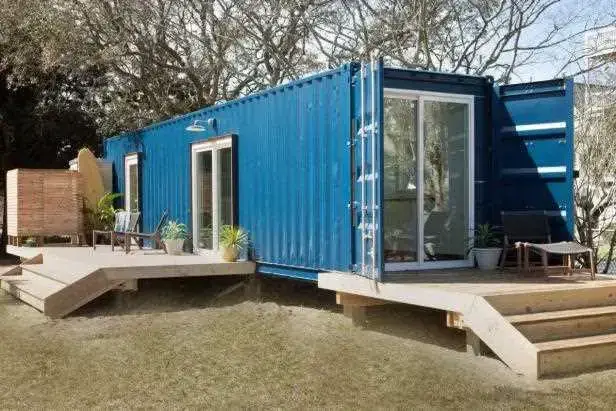
Second Example: A spacious and multi-level container home with multiple container units stacked together to create a unique and modern living space. The interior design is a perfect blend of industrial and contemporary styles.
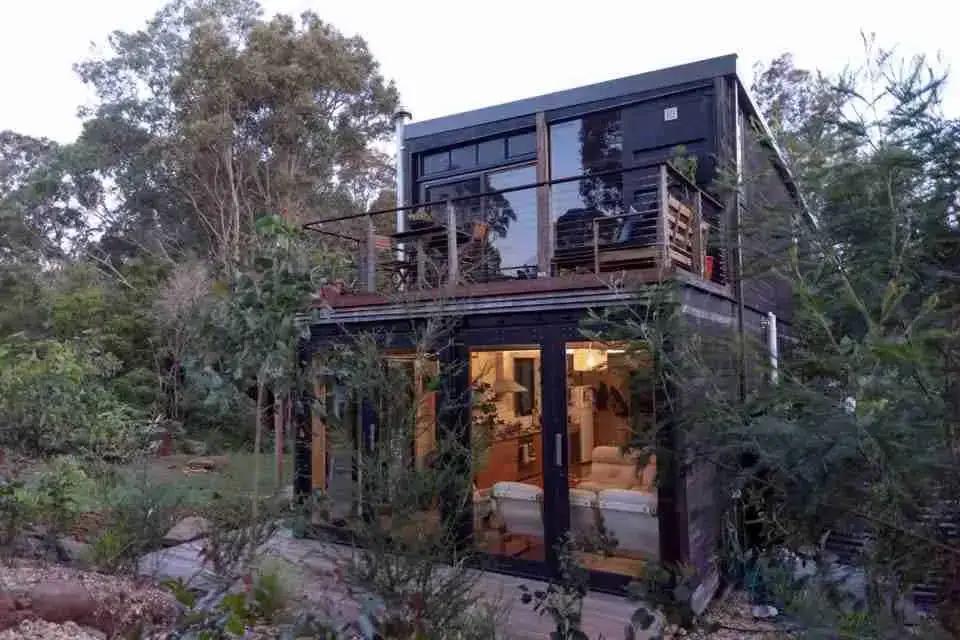
Third Example: A cozy and energy-efficient container home designed for sustainable living. Overall, this home showcases the use of recycled and eco-friendly materials. Note that this emphasizes North Carolina’s commitment to environmental stewardship.
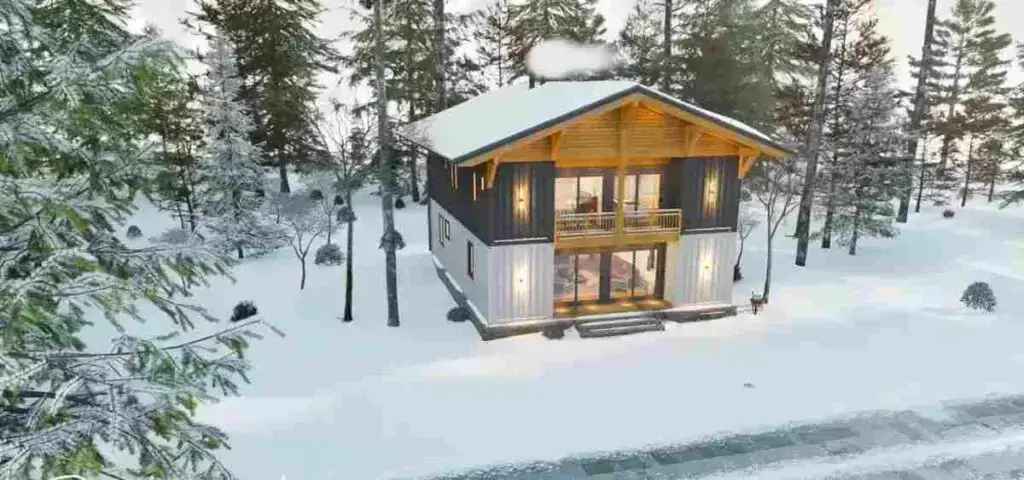
Tools You Will Need For Building a Shipping Container Home in North Carolina
When building container homes in NC, some tools are a must have. Of course this is all dependent on your budget.
For instance, to easily cut through the Corten steel that makes up the shipping container, we would advice you use a plasma cutter. This is however beyond the budget of some.
At the same time, unless you’re a professional builder, a plasma cutter wouldn’t be ideal, since after your container home build in North Carolina, you will find little use for it.
At any rate, we’ve compiled a list of some sturdy and affordable plasma cutters. These can really save you a lot of time and man hours while building your container house in NC. Have a look at them below.

- Powerful and reliable machine.
- Capable of cutting up to 1/2 inch steel, aluminum, and stainless steel.
- Built-in pilot arc for easy starting and quick cutting.
- Auto air pressure shut-off, over-temperature protection, anti-stick technology.
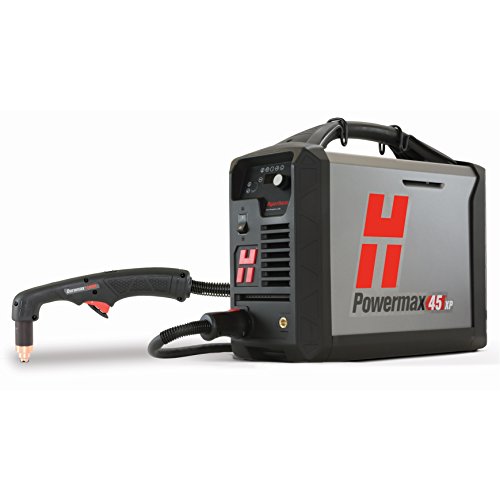
- Powerful and reliable machine.
- Featuring True Hole technology and adjustable amperage.
- Built-in air compressor.
- Easy-to-use control panel, and an ergonomic handle.
- Efficient.
DEWALT 20V MAX DCG413B and the Milwaukee M18 FUEL Angle Grinders
If a plasma cutter isn’t your choice, the next best tool for shipping container home builders in NC would be the angle grinder.
An angle grinder would be an ideal tool. Plus, it’s something you can use for several other projects beside a container home build.
When it comes to angle grinders for building shipping container homes, two of the most popular options on the market are the DEWALT 20V MAX DCG413B and the Milwaukee M18 FUEL. These angle grinders are both excellent for cutting, grinding, and polishing metal surfaces.
Dewalt 20V MAX DCG413B Runtime
The brushless motor in the DEWALT 20V MAX DCG413B angle grinder provides up to 57% greater runtime than typical brushed motors.
The motor is also engineered to run cooler, reducing fatigue and increasing productivity. The angle grinder also has a dust ejection system that keeps dust and debris out of the motor for extended motor life.
It also boasts an ergonomic, slender grip handle that is easy to use for long periods of time. Furthermore, the DEWALT 20V MAX DCG413B angle grinder incorporates a quick-change wheel release for simple wheel changes without the use of a tool.
The brushless motor in the Milwaukee M18 FUEL angle grinder provides up to 10% more power than regular brushed motors.
The angle grinder also has an overload prevention system to protect the motor and gearbox from damage caused by heavy loads.
Furthermore, the Milwaukee M18 FUEL angle grinder features a 3-mode speed selection lever for precise control of the grinding speed, providing for improved accuracy and control.
What to Pick Between DEWALT 20V MAX DCG413B and the Milwaukee M18 FUEL
For shipping container home builders in NC, it boils down to personal choice when choosing between the DEWALT 20V MAX DCG413B and the Milwaukee M18 FUEL angle grinders. Both angle grinders provide great performance and features and are appropriate for shipping container home construction.
The DEWALT 20V MAX DCG413B angle grinder, on the other hand, has more features. These include a dust ejection system and a quick-change wheel release, whilst the Milwaukee M18 FUEL angle grinder is more powerful and has a 3-mode speed selection option.
Finally, the DEWALT 20V MAX DCG413B is the preferable pick for shipping container home construction.
Read More on Important Tools for Building a Container Home
Financing Options and Insurance for Container Homes in North Carolina
Building a container home in North Carolina offers a unique and sustainable housing option, but it’s important to consider the financing and insurance aspects of this innovative choice.
Here, we provide an overview of financing options, insurance considerations, and expert advice to help you navigate the financial and insurance aspects of container home construction.
A. Overview of Financing Options and Loans Available for Container Home Projects
When it comes to financing container homes in North Carolina, several options are available to homeowners. Traditional mortgage lenders, credit unions, and specialized lenders offer loans specifically tailored for sustainable housing projects like container homes.
Additionally, there are government programs that provide financial assistance or incentives for eco-friendly housing initiatives. These programs may include grants, tax credits, or low-interest loans aimed at promoting sustainability and affordable housing options in the state.
It’s essential to research and compare different financing options to find the best fit for your container home project. Consider factors such as interest rates, loan terms, and the lenders’ experience with container home construction.
B. Insurance Considerations and Coverage Options for Container Homes in North Carolina
I talked about this in passing earlier, but it doesn’t hurt to emphasize. Remember that insuring your container home in North Carolina is crucial to protect your investment.
While container homes offer durability and resilience, insurance coverage is necessary to guard against unforeseen events such as natural disasters, theft, or accidents.
Insurance providers recognize container homes as a valid housing option and offer coverage specific to this type of dwelling. When selecting an insurance policy, make sure it includes coverage for the container structure, personal belongings, and liability protection.
It’s recommended to consult with insurance agents who understand the unique nature of container homes. They can guide you through the insurance process, provide quotes, and help you choose the right policy tailored to your container home project.
C. Expert Advice and Resources for Securing Financing and Insurance for Container Homes
Accordingly, securing financing and insurance for container homes can be simplified by seeking expert advice and utilizing available resources. The following are valuable resources to help you navigate the financial and insurance aspects of your container home project in North Carolina:
- Firstly, connect with local lenders and mortgage specialists experienced in eco-friendly and alternative construction projects.
- Secondly, consult with insurance agents who specialize in insuring container homes and understand the unique needs of this type of dwelling.
- Explore government programs, grants, and subsidies aimed at promoting sustainable housing initiatives.
- Join online forums and communities dedicated to container home construction, where homeowners share their experiences and recommendations.
- Finally, attend workshops or seminars focused on sustainable housing to gain insights from industry experts and professionals.
By leveraging expert advice and utilizing available resources, financing and insuring your container home in North Carolina becomes a more manageable and informed process.
Read More on 15 Best Container Homes You Can Own Under $100K


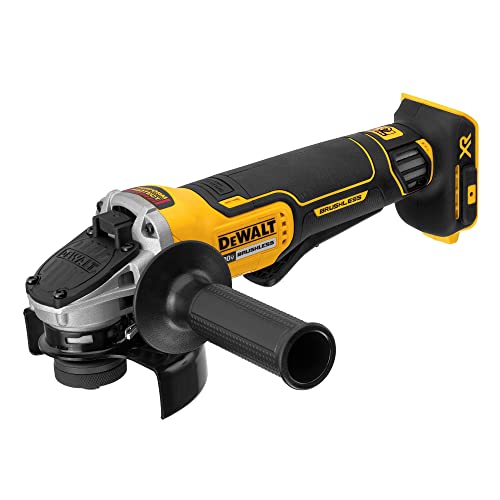


Saturday 8th of April 2023
5
homesolarwind
Friday 24th of March 2023
5
Mark Thelwell
Friday 28th of January 2022
Names of some home containers builder’s
Monday 20th of November 2023
@Mark Thelwell, These are now covered here. https://homesolarwind.com/the-truth-about-shipping-container-homes-in-north-carolina/#Local_Companies_and_Builders_Specializing_in_Container_Home_Construction_in_North_Carolina
homesolarwind
Friday 28th of January 2022
Daron Builders also seem to do a good job. Daronbuilders.com.
homesolarwind
Friday 28th of January 2022
Hi, Mark Thelwell. You can try JEM Shipping container homes, but then again, make sure you do your due diligence while engaging them as we're not directly affiliated with them. Thanks.